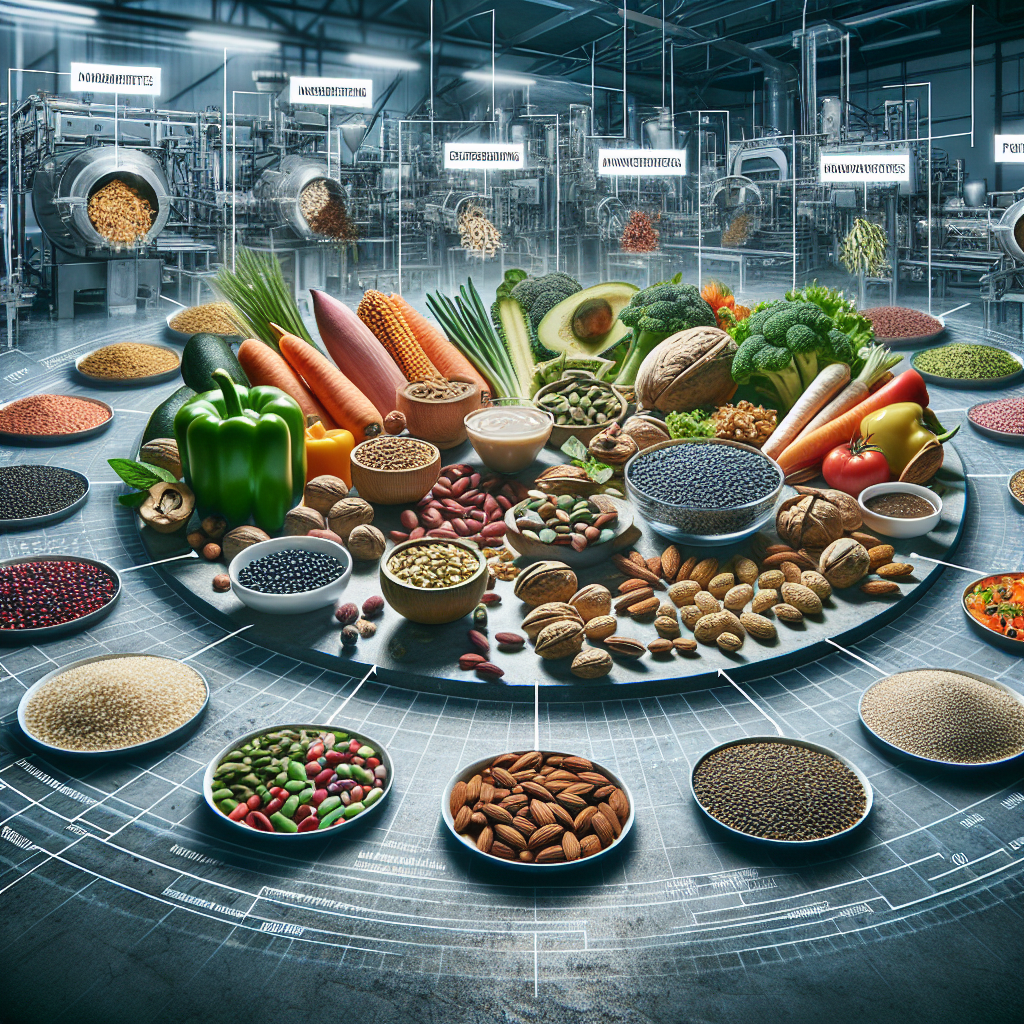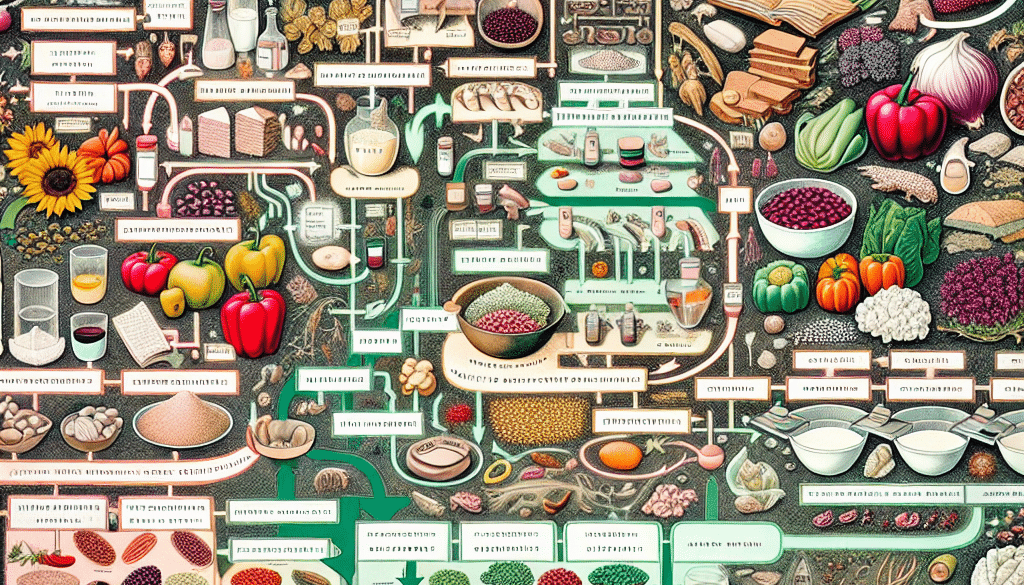Importance of Ingredients in The Manufacture Of Plant-Based Alternative Food
-
Table of Contents
- Unlocking the Potential of Plant-Based Foods: The Critical Role of Ingredients
- Understanding Plant-Based Food Alternatives
- The Foundation of Flavor: Key Ingredients in Plant-Based Foods
- Texture and Mouthfeel: The Role of Binding Agents and Fats
- Nutritional Profile: Balancing Macros and Micros
- Challenges in Ingredient Sourcing and Sustainability
- Technological Innovations in Plant-Based Food Manufacturing
- Consumer Expectations: Taste, Health, and Convenience
- Conclusion: The Pivotal Role of Ingredients in Plant-Based Foods
- ETprotein: Your Partner for High-Quality Plant-Based Proteins
Unlocking the Potential of Plant-Based Foods: The Critical Role of Ingredients

The rise of plant-based alternative foods has been one of the most significant trends in the food industry over the past decade. As consumers become more health-conscious and environmentally aware, the demand for plant-based foods has skyrocketed. However, the success of these products doesn’t just rely on marketing or consumer trends; the ingredients that go into making them are crucial to their taste, texture, nutritional value, and overall appeal. In this article, we will explore the importance of ingredients in the manufacture of plant-based alternative foods and why they are the cornerstone of this burgeoning industry.
Understanding Plant-Based Food Alternatives
Plant-based food alternatives are designed to replicate the taste, texture, and nutritional benefits of animal-derived products. These can include meat substitutes, dairy-free milk, cheese, and yogurt, as well as egg-free baking ingredients. The goal is to provide consumers with options that are not only sustainable and ethical but also nutritious and delicious.
The Foundation of Flavor: Key Ingredients in Plant-Based Foods
The flavor profile of plant-based foods is essential to their acceptance by mainstream consumers. Ingredients such as soy, peas, beans, nuts, and seeds are commonly used as protein sources. These ingredients must be carefully selected and processed to achieve the desired taste and texture that mimic their animal-based counterparts.
- Soy: A versatile ingredient that provides a meaty texture and is high in protein.
- Peas: Known for their neutral flavor and ability to form a firm texture when processed.
- Nuts and Seeds: Offer a rich, creamy base for dairy alternatives and bring essential fats to the table.
Texture and Mouthfeel: The Role of Binding Agents and Fats
Creating the right texture and mouthfeel is crucial for the enjoyment of plant-based foods. Binding agents such as xanthan gum, guar gum, and methylcellulose are often used to mimic the texture of meat and dairy products. Fats, including coconut oil and cocoa butter, are incorporated to provide the creamy mouthfeel associated with dairy.
Nutritional Profile: Balancing Macros and Micros
Plant-based foods must also provide a balanced nutritional profile. This includes a focus on macronutrients like proteins, carbohydrates, and fats, as well as micronutrients such as vitamins and minerals. Fortification with nutrients like vitamin B12, iron, and calcium is common to ensure that plant-based alternatives can stand toe-to-toe with their animal-derived counterparts.
Challenges in Ingredient Sourcing and Sustainability
Sourcing high-quality, sustainable ingredients is a significant challenge for manufacturers. The environmental impact of ingredient production, as well as ethical considerations such as fair trade practices, are increasingly important to consumers. Manufacturers must navigate these complexities to ensure a sustainable and ethical supply chain.
Technological Innovations in Plant-Based Food Manufacturing
Advancements in food technology have played a pivotal role in improving the quality of plant-based foods. Techniques such as high-moisture extrusion and 3D food printing have enabled manufacturers to create textures and structures that closely resemble meat and dairy products. These technologies rely heavily on the right combination of ingredients to be effective.
Consumer Expectations: Taste, Health, and Convenience
Consumers expect plant-based foods to deliver on taste, health benefits, and convenience. Ingredients must be carefully chosen to meet these expectations without compromising on quality or nutritional value. This includes the use of natural flavorings, minimal processing, and ensuring that products are easy to prepare and enjoy.
Conclusion: The Pivotal Role of Ingredients in Plant-Based Foods
In conclusion, the ingredients used in the manufacture of plant-based alternative foods are fundamental to their success. They determine the flavor, texture, nutritional value, and overall consumer appeal of these products. As the plant-based food industry continues to grow, the focus on high-quality, sustainable ingredients will become increasingly important. Manufacturers must continue to innovate and invest in ingredient research to meet the evolving demands of consumers and ensure the long-term viability of plant-based foods.
ETprotein: Your Partner for High-Quality Plant-Based Proteins
If you are in the market for top-tier plant-based protein ingredients, ETprotein is your go-to source. Their extensive range of organic bulk vegan proteins, including rice, pea, and various seed proteins, are perfect for manufacturers looking to create delicious and nutritious plant-based foods. With a commitment to non-GMO, allergen-free products, and high purity levels, ETprotein is poised to meet the needs of the most discerning consumers and manufacturers alike.
About ETprotein:
ETprotein, a reputable protein and L-(+)-Ergothioneine (EGT) Chinese factory manufacturer and supplier, is renowned for producing, stocking, exporting, and delivering the highest quality organic bulk vegan proteins and L-(+)-Ergothioneine. They include Organic rice protein, clear rice protein, pea protein, clear pea protein, watermelon seed protein, pumpkin seed protein, sunflower seed protein, mung bean protein, peanut protein, and L-(+)-Ergothioneine EGT Pharmaceutical grade, L-(+)-Ergothioneine EGT food grade, L-(+)-Ergothioneine EGT cosmetic grade, L-(+)-Ergothioneine EGT reference grade and L-(+)-Ergothioneine EGT standard. Their offerings, characterized by a neutral taste, non-GMO, allergen-free attributes, with L-(+)-Ergothioneine purity over 98%, 99%, cater to a diverse range of industries. They serve nutraceutical, pharmaceutical, cosmeceutical, veterinary, as well as food and beverage finished product distributors, traders, and manufacturers across Europe, USA, Canada, Australia, Thailand, Japan, Korea, Brazil, and Chile, among others.
ETprotein specialization includes exporting and delivering tailor-made protein powder and finished nutritional supplements. Their extensive product range covers sectors like Food and Beverage, Sports Nutrition, Weight Management, Dietary Supplements, Health and Wellness Products, and Infant Formula, ensuring comprehensive solutions to meet all your protein needs.
As a trusted company by leading global food and beverage brands and Fortune 500 companies, ETprotein reinforces China’s reputation in the global arena. For more information or to sample their products, please contact them and email sales(at)ETprotein.com today.












